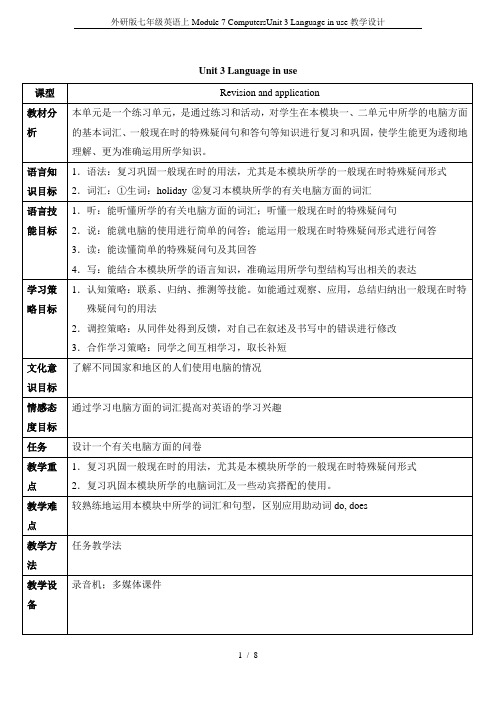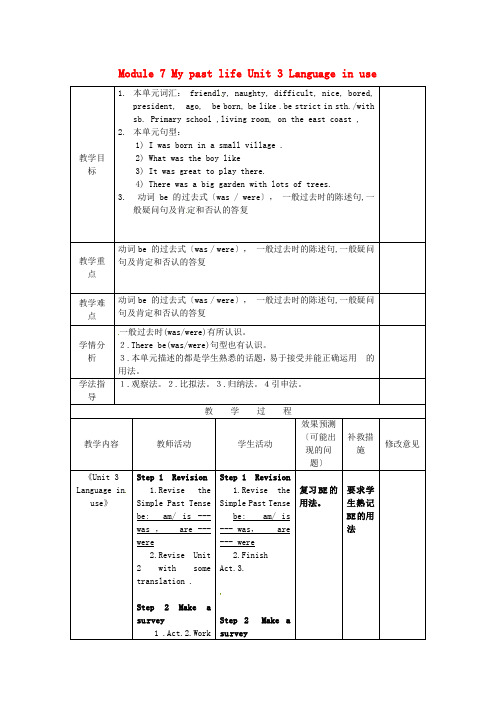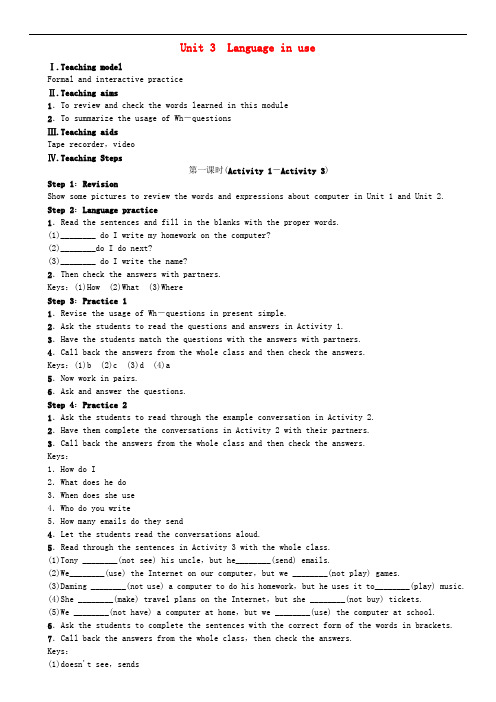外研版七年级英语上册Module7Unit3Languageinuse教案
- 格式:doc
- 大小:116.51 KB
- 文档页数:6

外研版英语七年级上册Module 7 Unit 3《Language in use》教学设计一. 教材分析外研版英语七年级上册Module 7 Unit 3《Language in use》主要讲述了日常生活中的交际用语,包括问候、介绍、道别等情景。
本节课的内容与学生的生活紧密相连,有利于激发学生的学习兴趣和积极性。
教材通过丰富的语言材料,帮助学生巩固和扩展英语词汇、语法和功能句型,提高学生的语言运用能力。
二. 学情分析七年级的学生已经掌握了基本的英语语法和词汇,具备一定的听说读写能力。
但部分学生在实际运用英语进行交际时,仍存在一定的困难。
针对这一情况,教师应注重激发学生的学习兴趣,创设真实的交际情境,让学生在实践中提高语言运用能力。
三. 教学目标1.知识目标:–掌握问候、介绍、道别等日常交际用语。
–学会使用一般现在时描述人的性格和习惯。
–扩展词汇量,学习与日常生活相关的词汇。
2.能力目标:–能够用英语进行简单的日常交际。
–提高听、说、读、写的能力,尤其是口语表达能力。
3.情感目标:–增强学生对英语学习的兴趣,提高自信心。
–培养良好的学习习惯和合作精神。
四. 教学重难点•问候、介绍、道别等日常交际用语。
•一般现在时的运用。
•与日常生活相关的词汇。
•一般现在时描述人的性格和习惯。
•真实交际情境中的语言运用。
五. 教学方法1.情境教学法:通过创设真实的交际情境,让学生在实践中学习英语。
2.任务型教学法:通过完成小组任务,激发学生的合作精神和团队意识。
3.交际式教学法:注重学生之间的互动,提高学生的口语表达能力。
4.游戏教学法:通过趣味性强的游戏,增加学生的学习兴趣。
六. 教学准备1.教材:外研版英语七年级上册Module 7 Unit 3《Language in use》。
2.多媒体设备:投影仪、电脑、音响等。
3.教学道具:图片、卡片等。
4.课件:根据教学内容制作的PPT。
七. 教学过程1.导入(5分钟)利用课件展示一组图片,包括不同的人物、场景和活动。


Module 7 My past life Unit 3 Language in use教学目标1.本单元词汇: friendl y, naughty, difficult, nice, bored,president, ago, be born, be like .be strict in sth./with sb. Primary school ,living room, on the east coast , 2.本单元句型:1) I was born in a small village .2) What was the boy like3) It was great to play there.4) There was a big garden with lots of trees.3.动词be 的过去式〔was / were〕,一般过去时的陈述句,一般疑问句及肯定和否认的答复教学重点动词be 的过去式〔was / were〕,一般过去时的陈述句,一般疑问句及肯定和否认的答复教学难点动词be 的过去式〔was / were〕,一般过去时的陈述句,一般疑问句及肯定和否认的答复学情分析一般过去时(was/were)有所认识。
2.There be(was/were)句型也有认识。
3.本单元描述的都是学生熟悉的话题,易于接受并能正确运用的用法。
学法指导1.观察法。
2.比拟法。
3.归纳法。
4引申法。
教学过程教学内容教师活动学生活动效果预测〔可能出现的问题〕补救措施修改意见《Unit 3 Language inuse》Step 1 Revision1.Revise theSimple Past Tensebe: am/ is ---was , are ---were2.Revise Unit2 with sometranslation .Step 2 Make asu rvey1 .Act.2.WorkStep 1 Revision1.Revise theSimple Past Tensebe: am/ is--- was, are--- were2.FinishAct.3.Step 2 Make asu rvey复习BE的用法。

Module 7 ComputersUnit 3 Language in use【学习目标】1. To summarize and consolidate present simple questions.2. To know something about computer.3. To have teamwork and make a poster of computer.【教学重难点】重点:Summarize and consolidate present simple questions.难点:Have teamwork and make a poster of computer.【教学方法】任务型教学法、小组合作法。
【教学过程】Step 1 Leading inDiscuss: How do you use the computers in daily life?(1) play games on the computer(2) send emails to friends(3) download music and films(4) chat online(5) search for information(6) do shopping online…Step 2 Pre-taskGrammar.Language practice:How do I write my homework on the computer?What do I do next?Where do I write the name?总结:特殊疑问句:一般现在时(3)特殊疑问句要由疑问代词或疑问副词开头,询问的内容不同,使用的疑问词也不同。
e.g. —What is this? 这是什么?—It’s a key.这是一把钥匙。
—How much is it? 这个多少钱?—It’s twenty dollars.二十美元。

Unit 3 Language in useⅠ.Teaching modelFormal and interactive practiceⅡ.Teaching aims1.To review and check the words learned in this module2.To summarize the usage of Wh-questionsⅢ.Teaching aidsTape recorder,videoⅣ.Teaching Steps第一课时(Activity 1-Activity 3)Step 1:RevisionShow some pictures to review the words and expressions about computer in Unit 1 and Unit 2. Step 2:Language practice1.Read the sentences and fill in the blanks with the proper words.(1)________ do I write my homework on the computer?(2)________do I do next?(3)________ do I write the name?2.Then check the answers with partners.Keys:(1)How (2)What (3)WhereStep 3:Practice 11.Revise the usage of Wh-questions in present simple.2.Ask the students to read the questions and answers in Activity 1.3.Have the students match the questions with the answers with partners.4.Call back the answers from the whole class and then check the answers.Keys:(1)b (2)c (3)d (4)a5.Now work in pairs.6.Ask and answer the questions.Step 4:Practice 21.Ask the students to read through the example conversation in Activity 2.2.Have them complete the conversations in Activity 2 with their partners.3.Call back the answers from the whole class and then check the answers.Keys:1.How do I2.What does he do3.When does she use4.Who do you write5.How many emails do they send4.Let the students read the conversations aloud.5.Read through the sentences in Activity 3 with the whole class.(1)Tony ________(not see) his uncle,but he________(send) emails.(2)We________(use) the Internet on our computer,but we ________(not play) games.(3)Daming ________(not use) a computer to do his homework,but he uses it to________(play) music.(4)She ________(make) travel plans on the Internet,but she ________(not buy) tickets.(5)We ________(not have) a computer at home,but we ________(use) the computer at school. 6.Ask the students to complete the sentences with the correct form of the words in brackets. 7.Call back the answers from the whole class,then check the answers.Keys:(1)doesn't see,sends(2)use,don't play(3)doesn't use,play(4)makes,doesn't buy(5)don't have,use8.Read the sentences together loudly.Step 5:Homework1.Revise all the key points in this module.2.Finish the workbook.Blackboard DesignUnit 3 Language in use(Activity 1-Activity 3) 1.How do I write my homework on the computer?2.What do I do next?3.Where do I write the name?。

M7U3课时备课5.通过对不同地区人们使用电脑情况的了解,提高对英语学习的积极性知识经验:1. Tom _______ his email every Saturday.2. I have a computer, but I don’t ____ it.3. Come to my office. Let’s _____ for our holiday.4. My mother doesn’t _______ computer games.5. I can _______ to my friends on the Internet.题目:My computer.词数不少于100词。
(注意特殊疑问句正确使用)句型转换1. The girl often sends her mother some emails.(改为同义句)The girl often _______ some emails _______ her mother.2. His sister works in a clothing store.(改为否定句)His sister _______ __________ in a clothing store.3. Next, I wash my hands.(对划线部分提问)____________________________________________4. Wang Fei usually has lunch at school.(改为一般疑问句)______ Wang Fei usually ________ lunch at school?5. People like bedrooms because they like sleeping. (对划线部分提问)_______ _______ people like bedrooms?1.通过阅读表达的文章构架,指导学生构建写作框架:总--分--总2.组内交流(1)文章框架,(2)每个段落可以写哪些方面内容?如何表达?(3)选择独立完成作文,两人合作完成或是组内交流完成作文。
外语教学与研究出版社《新标准》英语七年级上册教学设计Module 7 ComputersUnit Three Language in use(内容与其他单元模块不同)一、教材分析本模块以电脑的操作指令和使用为话题,共分设三个课时进行。
本节课是这个模块的第三课时,是一节复习课。
本单元的重点是通过前两个单元的话题进行复习,让学生更加了解电脑操作的和使用,并且能够熟练使用特殊疑问句进行提问。
二、教学目标1.语言知识目标掌握特殊疑问句的正确表达和运用。
2.技能目标能够用特殊疑问句对电脑操作提问并回答简单的操作方法。
3.学习策略目标通过小组合作的方式,学会合作学习,完成海报并且展示。
4.情感与态度目标在教学过程中,学生们通过参与话题活动,体验通过个人努力获得成功的乐趣,体验与他人合作,更好完成学习任务,创造学习成果的乐趣,并且通过本课学习,引导学生正确合理的使用电脑,培养学生对待电子游戏的正确态度。
5.教学重点和难点熟练运用特殊疑问句并能正确表扬使用电脑做事情。
三、教学设计本节课是一节以电脑为话题的复习课。
在整个的教学设计中,教师主要采取的是“情境教学法”,教师尽可能为学生们创设能够启发他们思维的多元化的教学环境,指导学生在真实的情境中进行语言知识的复习、巩固、运用,培养学生良好的听说习惯和综合运用英语的能力。
四、教学过程与方法I. Eing-up[操作方式] 师生问好,通过搭建复述框架,复习前两个模块的话题并直接导入本课的主题。
[设计意图] 复习本模块课文,激活潜在知识,以旧知带新知。
II. ExperienceStep 2. Ask and answer.1. 组内两人合作,根据图片创设情景进行特殊疑问句的问答。
[设计意图] 强化特殊疑问句的操练练习,强调特殊疑问词的选择,并且在练习过程中让学生自己总结特殊疑问句的规律,2. 环游世界:通过对短文的一系列提问,帮助孩子了解拓展有关世界上第一台计算机的知识。
七年级英语上册Module 7 Unit 3 Language in use.P1 Hello, everyone! I’m very happy to have this lesson with all of you. Today we will go over Unit 1 and Unit 2 of Module 7 as well as finish tasks in Unit 3. Are you ready? OK. Let’s begin our class.P2 (Step 1: Analysis of the material)首先来看看本节课我们将学到什么内容。
(点)P3 本节课是一节复习及拓展课。
通过本课的学习,我们的目标是:1.复习本模块的重点短语、句型;2.总结和巩固行为动词的一般现在时的特殊疑问句;3.了解计算机的发展史,巩固与计算机相关的语言知识;树立对待电脑和网络的正确态度。
(点)P4 我们从一小段对话来开始本课的学习,我们一起来看(点)P5 Read the conversation and pay attention to the blue words.(点)---Hi, I’m Betty. What’s your name? (点)---I’m Daming. Welcome to Beijing. Where do you come from?(点)---I come from America. (点)---How do you go to school every day? (点)---I go to school by bike.在这个小对话中,蓝色字标出的what,where和how都是特殊疑问词, 用来引导特殊疑问句。
本模块在语法上要求大家掌握行为动词的一般现在时的特殊疑问句。
(点)P6. Let’s look at the key sentences in this module. They are:How do I write my homework on the computer?What do I do next?Where do I write the name? (点)P7 通过上一模块的学习,我们了解了如何询问某人是否经常做某事。
Book 1 Module 7 Computer一、教学内容:Unit3 Language in use二、课型:Revision and application三、教学目标:1. 正确运用本模块的词汇。
2. 能运用特殊疑问句询问做某事的步骤以及细节。
3. 会描述做某事的步骤, 在同学之间进行真实的交际。
4、能简单表示计算机的用途。
四、教学重难点:能运用特殊疑问句询问做某事的步骤以及细节,并能描述做某事的步骤, 在同学之间进行真实的交际。
五、教学准备:本节课型为Revision and application,根据新课标的要求,结合教材和学生特点,主要采用任务型互动式进行教学,结合情景法、交际法、听说法、归纳法等教学方法实施课堂活动,开启学生思维,通过一系列有条理的教学活动,引导学生自主探究学习和与他人互动合作学习,让学生体验愉快学习。
本节课所需教具及资料:幻灯、图片、调查表等。
六、教学过程:compute r with the pictu res.hey forans wersWhat/ do on the” first, next,learned todacomputerI usually/ sometimes/ d on达标训练题一.按要求改写句子。
1. Tom sends three emails to his teacher.(对划线部分提问)2. Jim plays games on his computer. (变否定句)3.Lucy usually buys a ticket on the Internet. (对划线部分提问)4.Mr. Wang uses his computer in the evening. (对划线部分提问)5.She often does her homework on the computer. (变一般疑问句)二.按要求完成句子。
1.我经常上网搜索信息。
七年级英语上册Module 7 Unit 3 Language in use.P1 Hello, everyone! I’m Ms Liu, from Tianjin Ling Dang Gao Foreign Language Middle School. I’m very happy to have this lesson with all of you. Today we will go over Unit 1 and Unit 2 of Module 7 as well as finish tasks in Unit 3. Are you ready? OK. Let’s begin our class.P2 (Step 1: Analysis of the material)首先来看看本节课我们将学到什么内容。
(点)P3 本节课是一节复习及拓展课。
通过本课的学习,我们的目标是:1.复习本模块的重点短语、句型;2.总结和巩固行为动词的一般现在时的特殊疑问句;3.了解计算机的发展史,巩固与计算机相关的语言知识;树立对待电脑和网络的正确态度。
(点)P4 我们从一小段对话来开始本课的学习,我们一起来看(点)P5 Read the conversation and pay attention to the blue words.(点)---Hi, I’m Betty. What’s your name? (点)---I’m Daming. Welcome to Beijing. Where do you come from?(点)---I come from America. (点)---How do you go to school every day? (点)---I go to school by bike.在这个小对话中,蓝色字标出的what,where和how都是特殊疑问词, 用来引导特殊疑问句。
Book1Module7Computer
一、教学内容:Unit3Languageinuse
二、课型:Revisionandapplication
三、教学目标:
1.正确运用本模块的词汇。
2.能运用特殊疑问句询问做某事的步骤以及细节。
3.会描述做某事的步骤,在同学之间进行真实的交际。
4、能简单表示计算机的用途。
四、教学重难点:
能运用特殊疑问句询问做某事的步骤以及细节,并能描述做某事的步骤,在同学之间进行真实的交际。
五、教学准备:
本节课型为Revisionandapplication,根据新课标的要求,结合教材和学生特点,主要采用任务型互动式进行教学,结合情景法、交际法、听说法、归纳法等教学方法实施课堂活动,开启学生思维,通过一系列有条理的教学活动,引导学生自主探究学习和与他人互动合作学习,让学生体验愉快学习。
本节课所需教具及资料:幻灯、图片、调查表等。
六、教学过程:
1.Leading-in (7’)Showthepictu
resandaskthe
studentstoma
kedialoguesa
bouthowtowri
tehomeworkon
acomputer.
1.Thestudentsactou
tthedialoguesinpai
rsabouthowtowriteh
omeworkonacompute r
withthepictures.
复习并巩固如何
使用电脑写作业
的步骤以及前面
两个模块所学过
的单词。
能描述
一件事情的进
程。
2.While-ta sk(17’)1.Letthestud
entsdoActivi
ty1andthench
ecktheanswer
s.
2.Letthestud
entsdoActivi
ty2andthench
ecktheanswer
s.
anizati
on
anizati
1.Matchthequestion
swiththeanswers.Th
enchecktheanswersw
iththepartners.
pletetheconve
rsations.
3.T heywillhaveamat
ch forwritingontheb
lackboard.(Seewhic
hgroupcanwritethem
ostcorrectsentence
softhefourgroups.)
4.Twostudentswillc
ollectthesentences
复习并巩固特殊
疑问句的用法。
能掌握行为动词
一般现在时的特
殊疑问句及其回
答.并能运用一
般现在时来询问
如何做某事、在
什么地方做某事
等。
on
5.Letthestud entsdoActivi ty3andthe nch ecktheanswer s.
6.Askthestud entstowriteq uestionswith thewordsinth eform. ontheblackboard.An dseewhichgroupwill dothebest.
pletethesente nceswiththecorrect formofthewordsinbr ackets.
6.Thestudentswrite questionsandgetrea dytointerviewtheir bestfriend.
Questi
ons
ans we
rs
Where/useaco mputer
Who/goontheI nternet What/doonth ecomputer When/goonlin e
H ow/openado
cument …
3.Post-tas k (19’)anizati
on
anizati
on
1.Studentsintervie
wtheirbestfriendsa
boutusingacomputer
.Theyuse thequestio
nsintheformabovean
dwritedowntheirbes
tfriends’informat
ion
2.Makeareportabout
theirbestfriends’
answers,usingthein
formationintheform
.Thensharewiththec
lass.
通过小组内进行
采访和汇报的形
式,操练口头表
达能力。
让学生
学会灵活掌握行
为动词的一般现
在时中特殊疑问
句及其回答。
3.Askthestud
entstowritea
bouttheirusi
ngacomputerw
3.Writeanemailtoth
ebestfriendsaboutt
heirusingacomputer
with”first,next,t
通过写作的方式
把所学过的描述
一件事情的进程
的步骤熟练的展
ith”first,n ext,then,fin ally…”
anizati on. hen,finally…”.
4.Somestudentsshar etheiremailswithth
eclass.
示出来,真实地
运用到日常交际
当中去。
4.Summary (1’)1.Getthestud
entstosumupt
helanguagepo
ints.
T:Whathave we
learnedtoda y
?
Ss:……
2.Letthestud
entstochoose
thebestteami
nthislesson.
1.Sumupthelanguage
points.
2.Tochoosethebestg
roups.
引导学生对这节
课的总结,让学
生做自由发言,
培养学生自主学
习,自主总结的
良好学习习惯。
简短的评价使学
生的课堂表现得
到肯定并且可以
激励学生的学习
兴趣,树立学习
英语的信心。
5.Homework (1’)Writeanemailtoyourbestfriendabouttheirusingacomp uterwith”first,next,then,finally…”
板书设计Module7Computer
Unit3Languageinuse小组评价
First,next,then,finally,…T1T2T3
Iusually/sometimes/don’tusually…?
What…?
Where…?
Howoften…?
达标训练题
一.按要求改写句子。
1.Tomsendsthree emailstohisteacher.(对划线部分提问)
2.Jimplaysgamesonhiscomputer.(变否定句)
3.Lucyusuallybuys a ticketontheInternet.(对划线部分提问)
4.Mr.Wanguseshiscomputerintheevening.(对划线部分提问)
5.Sheoftendoesherhomeworkonthecomputer.(变一般疑问句) 二.按要求完成句子。
1.我经常上网搜索信息。
Ioften_______________________ontheInternet.
2.你通常怎样制定旅游计划。
Howdoyouusually_________________________?
3.请打开电脑。
Please_____________________thecomputer.
4.我没有时间去买票。
Ihaven’tgotanytimeto__________________.。